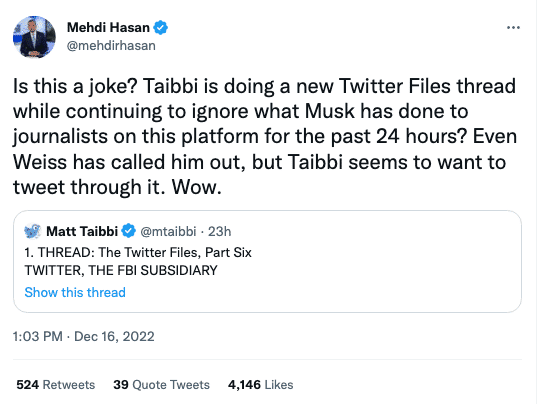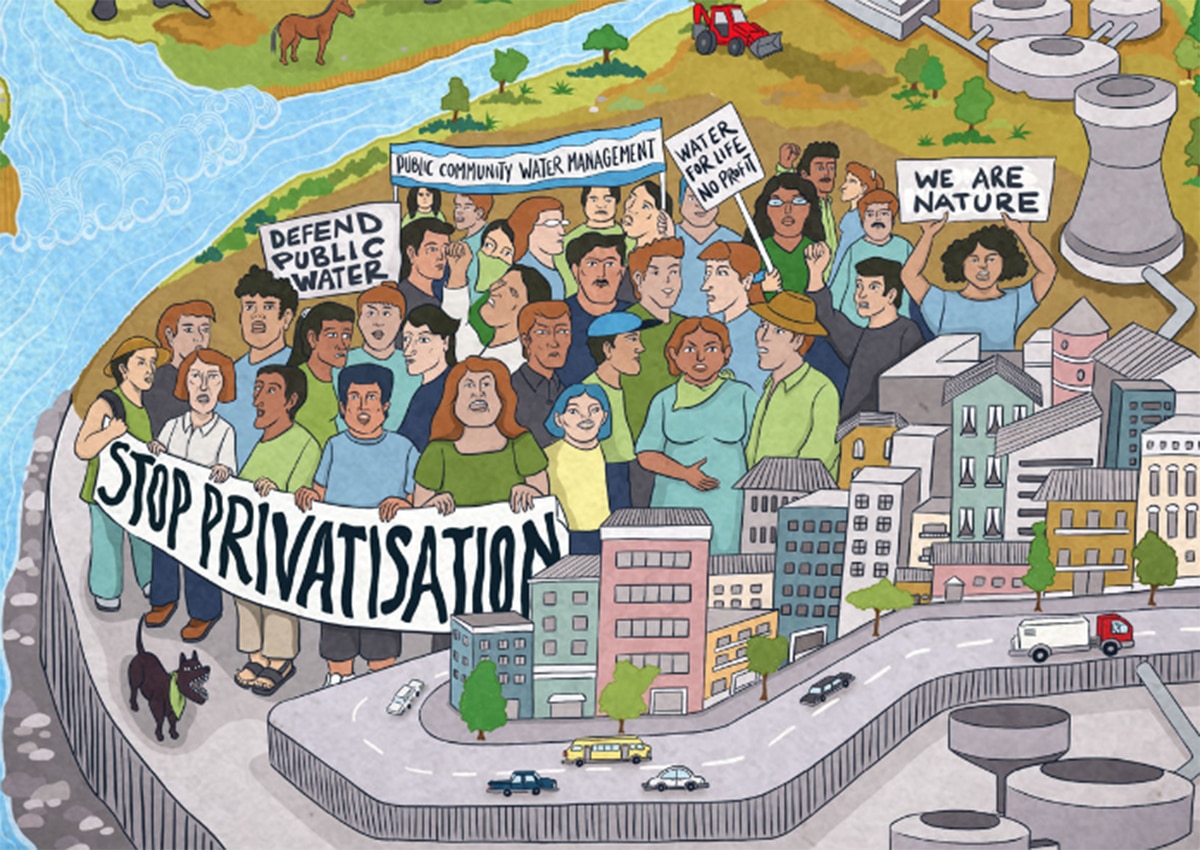
Notes on FBI/Twitter Story: Link to Text Version of Twitter Files Thread
by Matt Taibbi | Dec 17, 2022
As usual, the graphics in Friday night’s “Twitter Files” story make the entire thread too large to sneak through Gmail’s size limit. But a readable online version of the thread lives on the TK site. You can find it by clicking here.
Toward the end of work on this story a controversy blew up around the Twitter Files. I learned a little on Thursday night, and then apparently missed a whole drama that took place online Friday while I was trying to put the FBI story together.
Once that story was out, I saw just a few critics weigh in before falling asleep. This morning highlights were passed on to me by friends. The gist was expressed by MSNBC’s Mehdi Hasan, who’s taken over the role of Ardent Establishment Moralist from Rachel Maddow, who had a firm grip on it until she spent three years bollocking the Trump-Russia story. Mehdi’s had a raging cable-on for all things Elon Musk for a while, apparently. Here’s a tweet from yesterday:
I actually wasn’t silent about it (see last night’s Substack piece), but even if I had been, so what? These Twitter Files stories that are coming out are getting at issues that have nothing to do with Elon Musk, Keith Olbermann, Aaron Rupar, Barney the Dinosaur, or anyone else.
This is a chance for ordinary Americans to see, from the inside, how their tax dollars have been spent building an elaborate, systematized method of censorship and opinion control, with agencies like the DHS and the DOJ/FBI at the helm. These “enforcement” agencies are not fighting or investigating crime (or even, say, terror plots), they’re just collecting domestic intelligence on a grand scale, and seeking to distort the public’s perception of reality through mass moderation, via programs we’ve been told little to nothing about.
Hasan believes that just as we’re getting this state-sponsored mass-censorship program in our sights, I should stop, beat my breast on Twitter about an unrelated topic every other corporate journalist in the world is already wailing about, and make the story about me at exactly the moment we’ve found good reason for people to focus their attention on agencies like the FBI and the DHS.
There’s a divide in media, mostly generational, with conspicuous exceptions. The current reigning breed of press figure — Mehdi is a perfect example — imagines himself or herself to be first and foremost a political animal, someone who’s primary job is to advocate at all times for a point of view.
There’s an extraordinary emphasis on “calling out,” a concept that didn’t exist when I started doing this job. A parallel example to the lunacy of last night would be the parade of people in the past weeks who insisted I had a responsibility — because we both happened to be on the Twitter Files story — to confront Bari Weiss about past actions of hers involving Columbia University and professors accused of bias against Jewish students.
Because I didn’t throw a fit and walk out on a great story when Bari came on the scene, it’s evidence I’ve “aligned myself with the right.” I imagine once word gets out we were also civil and cooperative as we rummaged through the digital pile, this will be another count in the indictments against us both.
This is the same bugbear that afflicted signatories of the “Harper’s Letter,” many of whom found themselves accused of hypocrisy because they co-signed a statement with (circle one) Bari/J.K. Rowling/David Frum/Katie Herzog/Jesse Singal/Others, who were deemed Bad People for reasons X, Y, Z, etc. The idea was, we don’t judge people on the basis of what they say anymore. Instead, by co-signing a statement with others, we are now responsible — indeed, we’ve implicitly endorsed — the collective actions and opinions accrued over the lifetimes of all the people whose signatures are on the same page with ours.
Therefore you must not sign a statement, even if you believe in every word of it. You have to attach conditions: I won’t sign, you’re supposed to say, until the following three objectionable people are removed. You have to “call out” the very people who may have just gulped hard before agreeing to co-sign a petition with you.
The furor over who signed the Harper’s Letter succeeded in its obvious aim, which was to detract from its simple, humane message, which was good enough for Salman Rushdie and Noam Chomsky: “We refuse any false choice between justice and freedom, which cannot exist without each other.”
Instead of debating this proposition, national media turned the Harper’s Letter — quickly rechristened the “now-infamous letter” by the likes of Forbes — into a referendum on the views of people like Bari and J.K. Rowling. Its organizer, Thomas Chatterton Williams, became the subject of appalling attacks, and even after criticizing Donald Trump both in the letter and out of it, was criticized for failing to add enough quantity to his critique, not adding that Trump is a violent demagogue and mendacious racist in addition to something less than a genuine proponent of free speech. The Atlantic even pretended to be aghast that the Harpers signatories could worry about free expression in the pages of a magazine that does not pay its interns.
This was all a show, transparently designed to obscure the point. It’s beyond obvious the same phenomenon is going on with the Twitter Files.
I mentioned a divide in the business. There is another breed of media figure, dwindling in number, which doesn’t care where any interesting information or documentation comes from. Those of us in that group know we’re legally allowed to publish material that’s been stolen, and we’ll take newsworthy revelations from hackers, foreign spies, political zealots of all stripes, and crazy people (especially crazy people: they are some of our best sources). Some of the best journalism has come from interviews with gangsters and convicted murderers. We don’t care: if the stuff is real and newsworthy, we’ll print it.
Amid the rogue’s gallery of questionable sources for past scoops, Elon Musk doesn’t even get to the back of the line, if we’re going by infamy. He’s rich, which to some people is disqualifying, which makes no sense to me. You want sensitive information, but not if it comes from people with access to it? But, people say, he has motives! Forgive my language, but who the fuck doesn’t?
People who deliver information to the press do so for all sorts of reasons, and as journalists we of course consider them. Again, however, they’re not our main responsibility. We only have two questions in situations like this: is the material real, and is it of public interest? If the answers are yes, then we’re in, at which point the public absolutely should judge us. However, they should do it on the basis of the material, not other considerations, like whether or not we’ve called out the right fifty people before hitting send.
Elon Musk has been candid and straight with me, and there are a lot of things about him I definitely like, but he doesn’t need my endorsement and neither should anyone else. If we had a real press corps, its minions certainly wouldn’t be calling me about him or Bari Weiss at this moment. They would be calling about the FBI, DHS, ODNI and other such over-empowered entities, whose secrets are only just starting to bleed out. They’re the story, everything else is a head fake, and people like Mehdi know it.






0 Comments